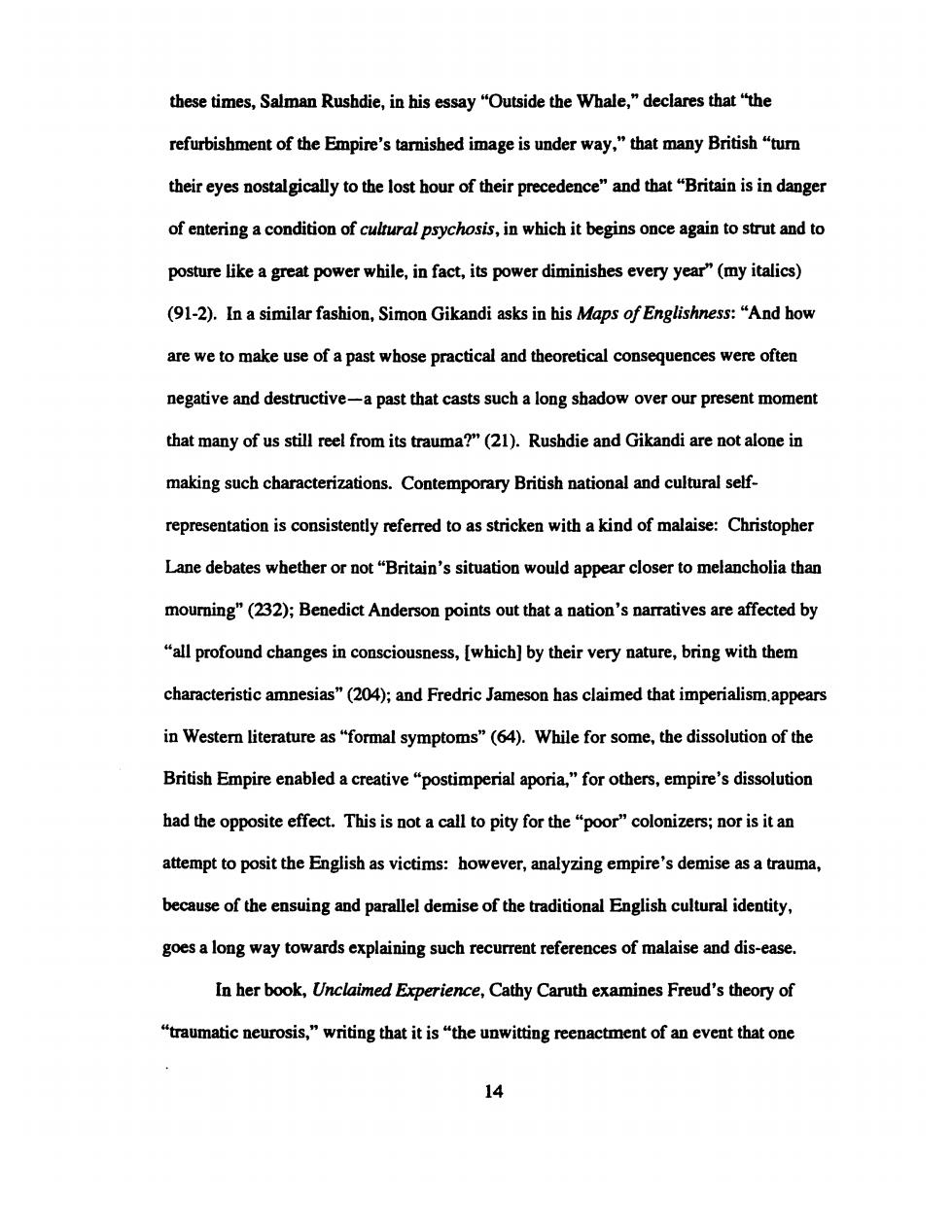
these times,Salman Rushdie,in his essay "Outside the Whale,"declares that "the refurbishment of the Empire's tarnished image is under way,"that many British "turn their eyes nostalgically to the lost hour of their precedence"and that"Britain is in danger of entering a condition of cultural psychosis,in which it begins once again to strut and to posture like a great power while,in fact,its power diminishes every year"(my italics) (91-2).In a similar fashion,Simon Gikandi asks in his Maps of Englishness:"And how are we to make use of a past whose practical and theoretical consequences were often negative and destructive-a past that casts such a long shadow over our present moment that many of us still reel from its trauma?"(21).Rushdie and Gikandi are not alone in making such characterizations.Contemporary British national and cultural self- representation is consistently referred to as stricken with a kind of malaise:Christopher Lane debates whether or not "Britain's situation would appear closer to melancholia than mourning"(232);Benedict Anderson points out that a nation's narratives are affected by "all profound changes in consciousness,[which]by their very nature,bring with them characteristic amnesias"(204);and Fredric Jameson has claimed that imperialism.appears in Western literature as"formal symptoms"(64).While for some,the dissolution of the British Empire enabled a creative "postimperial aporia,"for others,empire's dissolution had the opposite effect.This is not a call to pity for the"poor"colonizers;nor is it an attempt to posit the English as victims:however,analyzing empire's demise as a trauma, because of the ensuing and parallel demise of the traditional English cultural identity, goes a long way towards explaining such recurrent references of malaise and dis-ease. In her book,Unclaimed Experience,Cathy Caruth examines Freud's theory of "traumatic neurosis,"writing that it is "the unwitting reenactment of an event that one 14
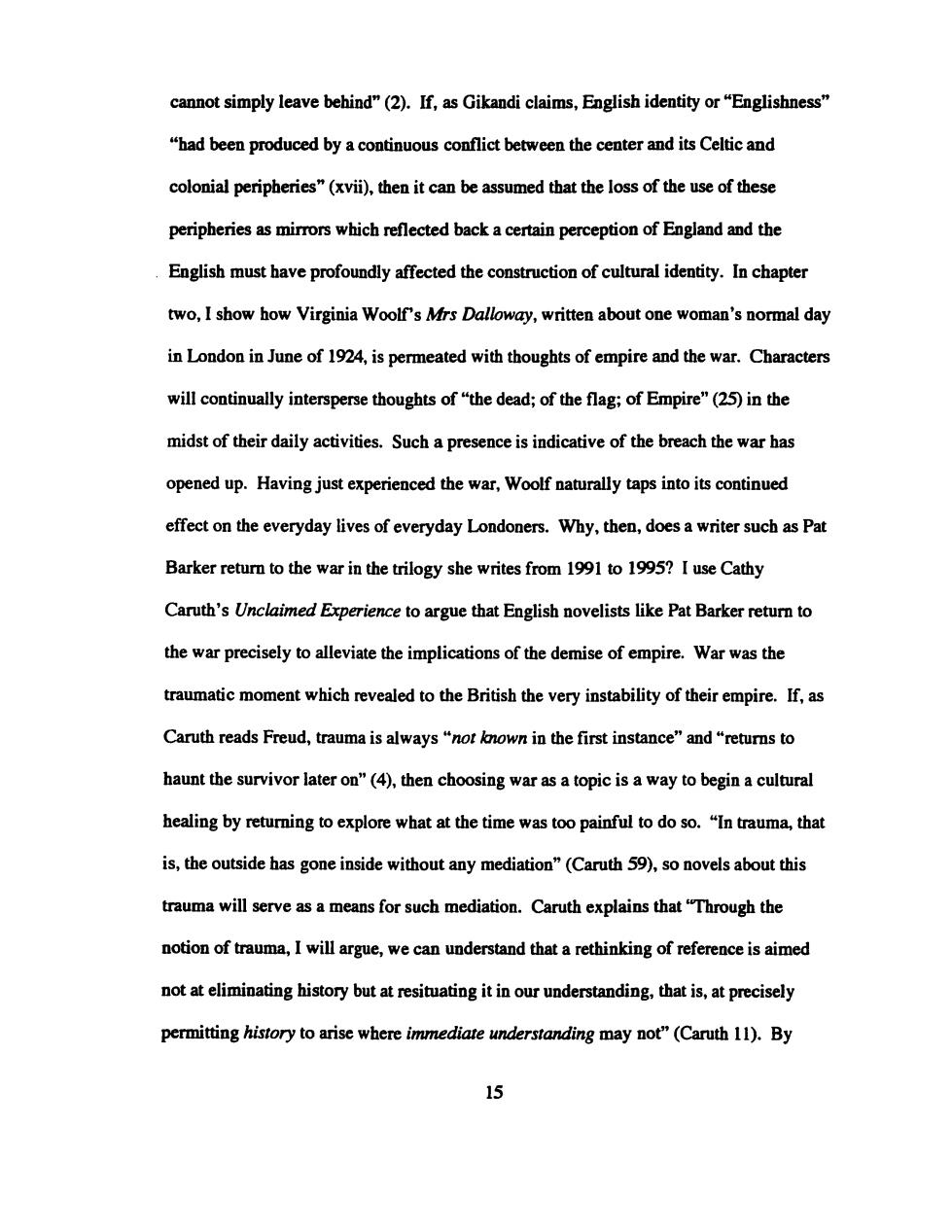
cannot simply leave behind"(2).If,as Gikandi claims,English identity or "Englishness" "had been produced by a continuous conflict between the center and its Celtic and colonial peripheries"(xvii),then it can be assumed that the loss of the use of these peripheries as mirrors which reflected back a certain perception of England and the English must have profoundly affected the construction of cultural identity.In chapter two,I show how Virginia Woolf's Mrs Dalloway,written about one woman's normal day in London in June of 1924,is permeated with thoughts of empire and the war.Characters will continually intersperse thoughts of "the dead;of the flag;of Empire"(25)in the midst of their daily activities.Such a presence is indicative of the breach the war has opened up.Having just experienced the war,Woolf naturally taps into its continued effect on the everyday lives of everyday Londoners.Why,then,does a writer such as Pat Barker return to the war in the trilogy she writes from 1991 to 1995?I use Cathy Caruth's Unclaimed Experience to argue that English novelists like Pat Barker return to the war precisely to alleviate the implications of the demise of empire.War was the traumatic moment which revealed to the British the very instability of their empire.If,as Caruth reads Freud,trauma is always "not known in the first instance"and"returns to haunt the survivor later on"(4),then choosing war as a topic is a way to begin a cultural healing by returning to explore what at the time was too painful to do so."In trauma,that is,the outside has gone inside without any mediation"(Caruth 59),so novels about this trauma will serve as a means for such mediation.Caruth explains that "Through the notion of trauma,I will argue,we can understand that a rethinking of reference is aimed not at eliminating history but at resituating it in our understanding,that is,at precisely permitting history to arise where immediate understanding may not"(Caruth 11).By 15
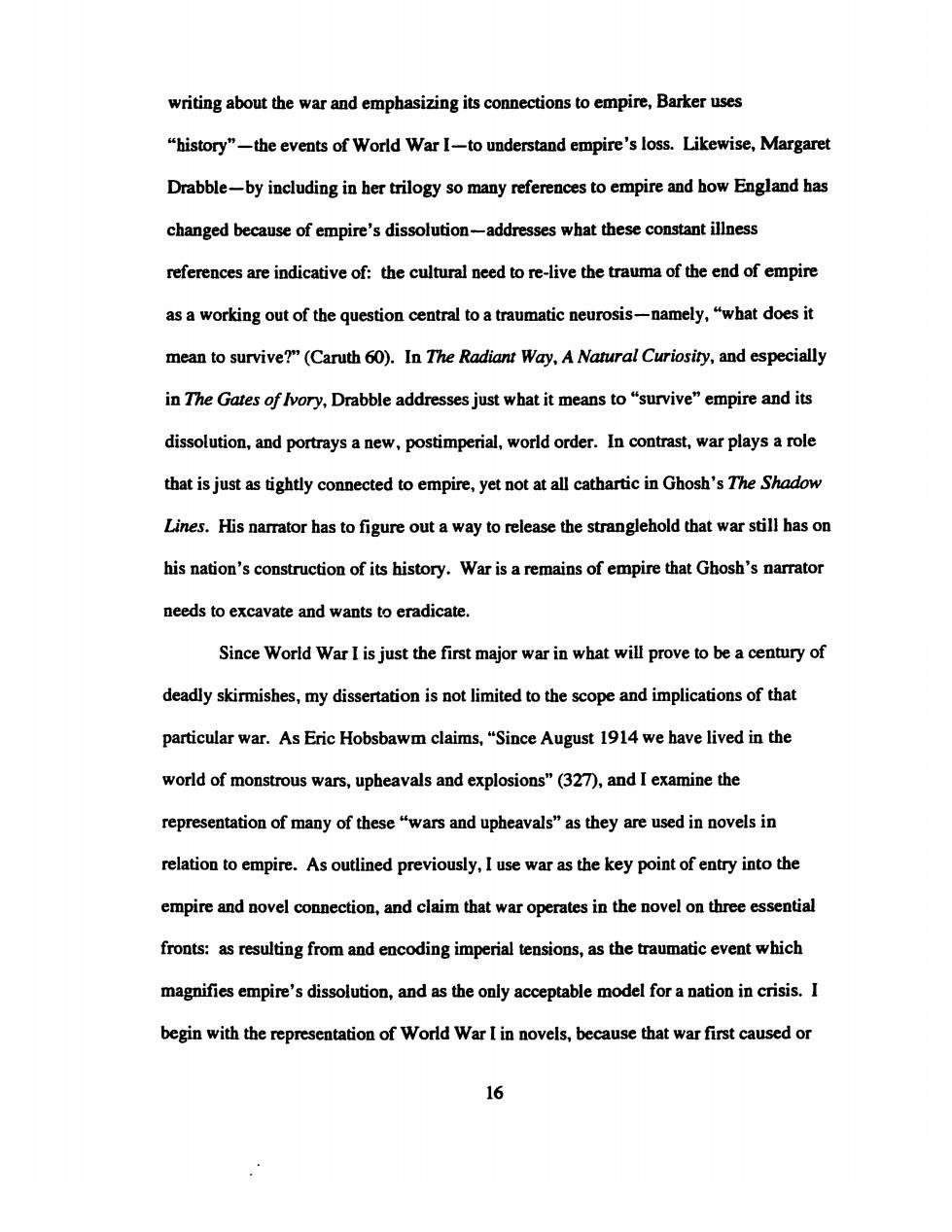
writing about the war and emphasizing its connections to empire,Barker uses "history"-the events of World War I-to understand empire's loss.Likewise,Margaret Drabble-by including in her trilogy so many references to empire and how England has changed because of empire's dissolution-addresses what these constant illness references are indicative of:the cultural need to re-live the trauma of the end of empire as a working out of the question central to a traumatic neurosis-namely,"what does it mean to survive?"(Caruth 60).In The Radiant Way,A Natural Curiosity,and especially in The Gates of /vory,Drabble addresses just what it means to "survive"empire and its dissolution,and portrays a new,postimperial,world order.In contrast,war plays a role that is just as tightly connected to empire,yet not at all cathartic in Ghosh's The Shadow Lines.His narrator has to figure out a way to release the stranglehold that war still has on his nation's construction of its history.War is a remains of empire that Ghosh's narrator needs to excavate and wants to eradicate. Since World War I is just the first major war in what will prove to be a century of deadly skirmishes,my dissertation is not limited to the scope and implications of that particular war.As Eric Hobsbawm claims,"Since August 1914 we have lived in the world of monstrous wars,upheavals and explosions"(327),and I examine the representation of many of these "wars and upheavals"as they are used in novels in relation to empire.As outlined previously,I use war as the key point of entry into the empire and novel connection,and claim that war operates in the novel on three essential fronts:as resulting from and encoding imperial tensions,as the traumatic event which magnifies empire's dissolution,and as the only acceptable model for a nation in crisis.I begin with the representation of World War I in novels,because that war first caused or 16
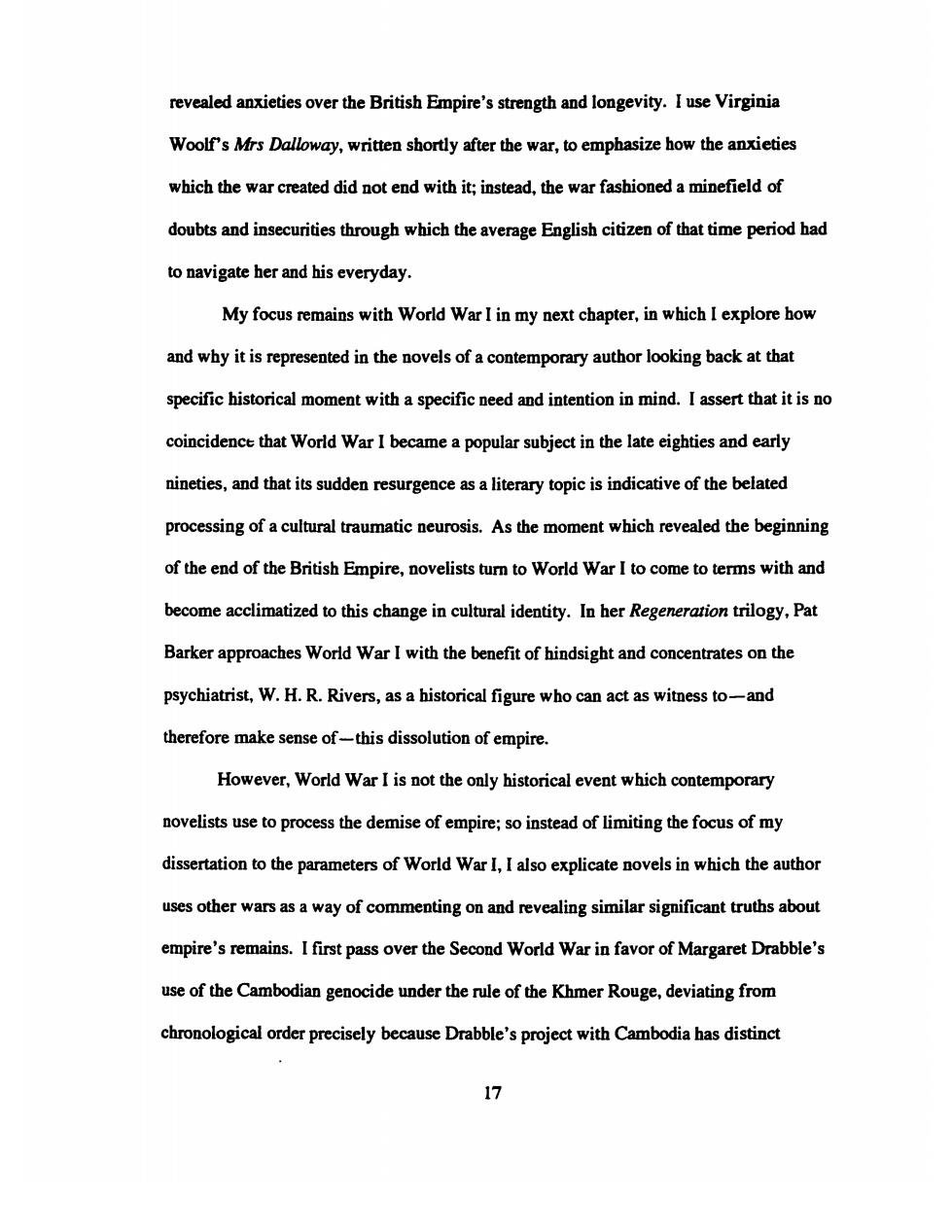
revealed anxieties over the British Empire's strength and longevity.I use Virginia Woolf's Mrs Dalloway,written shortly after the war,to emphasize how the anxieties which the war created did not end with it;instead,the war fashioned a minefield of doubts and insecurities through which the average English citizen of that time period had to navigate her and his everyday. My focus remains with World War I in my next chapter,in which I explore how and why it is represented in the novels of a contemporary author looking back at that specific historical moment with a specific need and intention in mind.I assert that it is no coincidence that World War I became a popular subject in the late eighties and early nineties,and that its sudden resurgence as a literary topic is indicative of the belated processing of a cultural traumatic neurosis.As the moment which revealed the beginning of the end of the British Empire,novelists turn to World War I to come to terms with and become acclimatized to this change in cultural identity.In her Regeneration trilogy,Pat Barker approaches World War I with the benefit of hindsight and concentrates on the psychiatrist,W.H.R.Rivers,as a historical figure who can act as witness to-and therefore make sense of-this dissolution of empire. However,World War I is not the only historical event which contemporary novelists use to process the demise of empire;so instead of limiting the focus of my dissertation to the parameters of World War I,I also explicate novels in which the author uses other wars as a way of commenting on and revealing similar significant truths about empire's remains.I first pass over the Second World War in favor of Margaret Drabble's use of the Cambodian genocide under the rule of the Khmer Rouge,deviating from chronological order precisely because Drabble's project with Cambodia has distinct 17
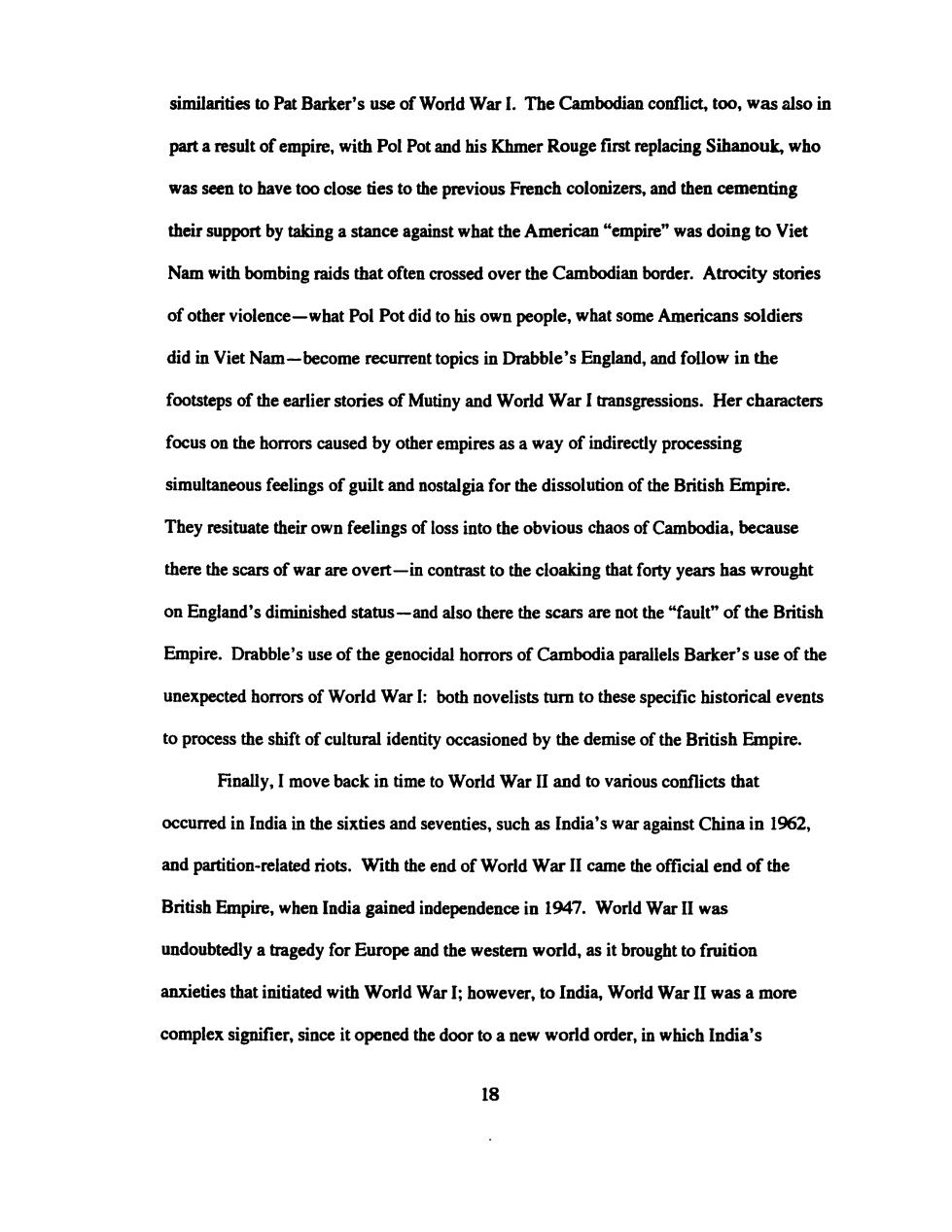
similarities to Pat Barker's use of World War I.The Cambodian conflict,too,was also in part a result of empire,with Pol Pot and his Khmer Rouge first replacing Sihanouk,who was seen to have too close ties to the previous French colonizers,and then cementing their support by taking a stance against what the American "empire"was doing to Viet Nam with bombing raids that often crossed over the Cambodian border.Atrocity stories of other violence-what Pol Pot did to his own people,what some Americans soldiers did in Viet Nam-become recurrent topics in Drabble's England,and follow in the footsteps of the earlier stories of Mutiny and World War I transgressions.Her characters focus on the horrors caused by other empires as a way of indirectly processing simultaneous feelings of guilt and nostalgia for the dissolution of the British Empire. They resituate their own feelings of loss into the obvious chaos of Cambodia,because there the scars of war are overt-in contrast to the cloaking that forty years has wrought on England's diminished status-and also there the scars are not the"fault"of the British Empire.Drabble's use of the genocidal horrors of Cambodia parallels Barker's use of the unexpected horrors of World War I:both novelists turn to these specific historical events to process the shift of cultural identity occasioned by the demise of the British Empire. Finally,I move back in time to World War II and to various conflicts that occurred in India in the sixties and seventies,such as India's war against China in 1962, and partition-related riots.With the end of World War II came the official end of the British Empire,when India gained independence in 1947.World War II was undoubtedly a tragedy for Europe and the westem world,as it brought to fruition anxieties that initiated with World War I;however,to India,World War II was a more complex signifier,since it opened the door to a new world order,in which India's 18